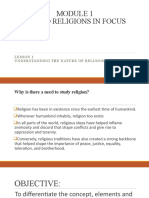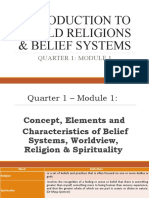Module Hum12023
Module Hum12023
Uploaded by
Joy Mae LopezCopyright:
Available Formats
Module Hum12023
Module Hum12023
Uploaded by
Joy Mae LopezOriginal Title
Copyright
Available Formats
Share this document
Did you find this document useful?
Is this content inappropriate?
Copyright:
Available Formats
Module Hum12023
Module Hum12023
Uploaded by
Joy Mae LopezCopyright:
Available Formats
World Religions and Belief Systems the belief that everything is god while panentheism is the belief that
everything is in god.
Belief is a mental state, a disposition or attitude about things, people, places, Another orientation toward God is atheism. This view denies the existence of a
or events. It does not necessarily require empirical evidence-that is, evidence god or gods. The disbelief is founded on the idea that there is no sufficient
gathered and verified through observation. basis or evidence to prove the existence of a god or gods.
Forming beliefs is one of the most fundamental and important features of the The third orientation concerning God is agnosticism. It tells that one can
mind and of religion as well. neither prove nor disprove the existence of a higher being named god or gods.
Religions have their set of beliefs, and these beliefs are important because (1) Agnostics use a skeptical argument to defend this position. Skeptics refer to
beliefs serve as a compass for people in choosing to behave the way they do; people who suspend judgment or have doubts on the existence of a god or
(2) beliefs help people see and/or make sense of reality; (3) beliefs form the gods.
values and character of a person; (4) beliefs move people to action; and (5)
beliefs are kinds of knowledge. INSTRUCTION: Read and understand the questions. Write your answers in a
separate sheet of paper.
Belief systems are systematically structured as a gauge to see the things that
make up reality. You operate within a system in order to integrate or make as a 1. Do you believe in God? Why or why not?
united whole all of what you perceive or sense. 2. What are your views on the people who doesn’t believe in God?
3. What values in your religion have you acquired so far? How do these values
A belief system has the following characteristics or elements: affect your interaction with other people?
1. Belief systems are value-laden. Religious belief systems are value-laden in a
sense that beliefs are aimed at developing values.These values are good and
considered basic to human life. These values are goodness, charity, love,
knowledge, faith, obedience, piety, mercy and compassion.
2. Belief systems are prescriptive. When a doctor prescribes medicine to a
patient, the latter ought to follow what the former has instructed. Belief
systems have the same degree of authority.
3. Belief systems are instrumental/purposive. The use or purpose of belief
systems is seen within the context of the goal of religions. Many religions
propagate the belief that salvation can be attained only by following its tenets.
4. Belief systems are communal. Religion is a social phenomenon because it is
a product of the social interaction among individuals of the same cultural,
historical, and geographical background.
There are at least three main dispositions or temperaments when it comes to
the belief in God: theism, atheism, and agnosticism. Theism is the belief in the
existence of God or gods. There are multiple variants of theism and common
among them are monotheism, polytheism, deism, pantheism, panentheism.
The difference between monotheism and polytheism is numerical.
Monotheism is the belief in god while polytheism is the belief in many gods.
Deism, does not involve any numerical view, as this is the belief that there is a
powerful or higher being who created the universe or the world but its
adherents do not believe that God intervenes in human affairs. Pantheism is
HOLY CROSS OF CABURAN, INC. tremendum. The feeling of it may at times come sweeping like a gentle tide, pervading
Jose Abad Santos, Davao Occidental the mind with a tranquil mood of deepest worship.
Humanities 1 ● Paul Tillich (1886-1965; philosopher) – Religion is the “ultimate concern for the
Module 1 ground of being”
● William James (1842-1910; philosopher/psychologist) – Religion is “the feeling,
What is Meant by Religion and Belief System? acts, and experiences of individual people in their solitude as they stand in relation to
Most people if not all, belong to a religion. Perhaps, you belong in a family that whatever they may consider as divine.”
deeply observes religious practices regularly and believes in its teachings or doctrines. ● Viktor Frankl (1905-1997; neurologist/psychiatrist) – Religion is a “function of
For instance, most religions believe in a god and teach salvation and good moral the spiritual unconscious, which is the source of the will to meaning.”
conduct. Judaism and Christianity believe that there is only one personal God. Hindus ● Emile Durkheim (1858-1917; sociologist) – Religion is “a unified system of
though believe in many gods and goddesses. In moral conduct, all religions adhere to beliefs and practices relative to sacred things which unite into one single moral
the Golden Rule: “Do not do unto others what you don’t want others do unto you.” community all those who adhere to them.”
Moreover, all religions not only adhere to the Golden Rule, but also to the basic moral
laws such as the following: The definition given by various scholars and experts in the field of religion can be
● Honor your father and mother categorized into three: substantive, functional, and family of resemblances.
● Respect the properties of others ● A substantive definition excludes or limits the subject matter of religion to simply
● Do not bear false witness about beliefs, institutions, and practices. This definition is content-oriented, in the
● Protect and serve the poor sense that it only tries to look into the essential characteristics of religion.
There is no absolute, universal, formal, or official definition of religion. Why? First ● A functional definition accommodates other important ideas such as creeds and
not all religions share the same beliefs, rituals, and doctrinal teachings. For example, principles, which are common in religions. The functional definition does not specify
Christianity and Judaism believe in only one personal God, Christians believe in a necessary content or elements as conditions for qualifying a religion, unlike what the
Trinitarian God. substantive approach does.
● All religions, to use Ludwig Wittgenstein’s concept, belong to a family or
Some Definitions of Religion resemblances. Applying this to religion, there is no set defining characteristics but
According to the Oxford English Dictionary, religion is an “action or conduct there is a network of similarities overlapping each other.
indicating belief in, obedience to, and reverence for a god, gods, or similar
superhuman power; and the performance of religious rites or observances. This Relationship between Religion and Philosophy of Religion
definition emphasizes two essential components of religion: (1) the belief in a Philosophy comes from the greek words philos and Sophia, which together mean
supernatural being; and (2) effort or commitment. “love of wisdom”. It is the study that tries to critically examine the nature, meaning,
By etymology, the word religion comes from three Latin variants: relegere, religari, structure, and value of things by the use of reason and logic. Philosophy is a broad
and re-eligere. Relegere, which literally means “to constantly return to” speaks about discipline that seeks to answer fundamental questions of being and other issues related
religious observances such as Holy Week in Christianity, Ramadan in Islam, and to it.
Passover in Judaism. Religari, which means “to be tied into”, refers to the Philosophy of religion is a branch of philosophy that deals with the philosophical
commitment to one’s own religion. Re-eligere, which means “to choose again”, refers analysis, reflection, and examination of the central issues, themes, topics, and
to conversion or going back to one’s roots or goals. problems about religion.
According to Winfried Corduan, a professor emeritus of philosophy and religion at As a discipline, philosophy of religion differs from religion on four counts. First,
Taylor University, Indiana, religion is a system of beliefs and practices that by means philosophy of religion is a method useful in understanding some complex issues about
of its cultus directs a person toward transcendence and, thus, provides meaning and religion such as God’s existence; God’s attributes, like omnipotence, omnipresence,
coherence to a person’s life. Max Műller, whom many regard as the founder or omniscience, and omnibenevolence; the problem of evil; and miracles. Second,
religious studies, defines religion as a body of doctrines handed down by tradition. philosophy of religion primarily uses reason as the source of making judgments.
Third, philosophy of religion is purely an intellectual enterprise. Lastly, philosophy of
Here are some definitions given by various disciplines whose views of religion, religion cannot substitute religion.
though limited are helpful in understanding the concept of religion.
● Friedrich Schleiermacher (1768-1834; theologian/philosopher) – Religion is “the The following are some more characteristics of philosophy of religion:
feeling of absolute dependence.” 1.It is not apologetics. This means that philosophy of religion does not provide
● Rudolf Otto (1869-1937; theologian/philosopher) – Religion is that which grows arguments in defense of faith.
out of, and gives expression to, experience of the holy in its various aspects. . . we are
dealing with something for which there is only one appropriate expression: mysterium
2.It is not a comparative religion. Philosophy of religion does not only examine belief INSTRUCTION: Read and understand the questions. Write your answers in a
systems descriptively, but also critically. It critically evaluates the soundness and separate sheet of paper.
rationality of religions’ belief systems.
3.It is evaluative. It analyzes religious themes in an evaluative manner rather than 1.What do relegere, religari, and re-eligere mean? What distinguishes one from the
descriptive. other?
Philosophy of religion examines the nature and other intricate issues of religion a 2.What are the four characteristics of philosophy of religion?
philosophical point of view, whereas religion provides the material or object of study 3.What is the relationship between faith and theology?
to philosophy. 4.Do you think being spiritual and religious are necessary to be a good person? Give a
concise and clear answer.
Relationship between Religion and Theology
Theology comes from the Greek words theos, which means “deity” or “god”, and
logos, which means “word” or “discourse”. It is the study or discourse about god or
gods. Theology functions as a method in forming a reasoned expression of faith. More
than a method, its objective is to critically examine and understand the content of
faith.
One cannot have a strong belief or faith, that is, a personal conviction or commitment-
on something one cannot explain.
The relationship between faith and theology is seen in the role that faith plays in
theology. Faith gives form to theology, while theology sets the intellectual mode of
believers for faith to be understood. Furthermore, faith provides theology various
modes by which to understand its own content. Therefore, a critical knowledge of
faith is required in theology.
Relationship between Religion and Spirituality
One of the basic principles of religion is the belief that human beings have material
and nonmaterial dimensions.
Spirituality means that the human person sees more than what he or she touches,
seeing a better world not pillaged by human greed and selfishness, and working to
establish that world here and no, in this planet. However, “soul” is thought of as
different from “spirit”. The word spirit comes from the Latin word spiritus, which
means, “breath.” In Greek, “spirit” is pneuma while “soul” is psyche. While pneuma
refers to “breath”, psyche, to the human mind and personality.
Spirit, unlike soul, has a wider range of uses depending on the context. For example,
in the Christian context, the word spirit can be used to describe God (but not the word
soul). Christians believe that God is a spirit but do not believe that God is a soul or
has a soul.
A spiritual person has a revolutionary spirit and possesses radical beliefs. You see this
in the likes of Jesus Christ, Buddha, the Dalai Lama, Socrates, Confucius, and Laozi
who are regarded as spiritual models.
Spirituality and religion are considered by some to be either the same or strongly
linked because spirituality as a meaningful human activity centers on one’s quest for
meaning and purpose, which is touched by religion.
The modern sense of spirituality points to a subjective or personal quest of an
individual without any influence from religion. Those who embark on such a quest are
called spiritual but not religious (SBNR) people. Adherents and proponents of SBNR
are also known as unchurched, eclectic, unaffiliated, spiritual seekers, or freethinkers.
You might also like
- (Powerpoint) Introduction To World Religions and Belief SystemsDocument75 pages(Powerpoint) Introduction To World Religions and Belief SystemsAdrian Dionisio100% (20)
- (Powerpoint) Introduction To World Religions and Belief SystemsDocument30 pages(Powerpoint) Introduction To World Religions and Belief SystemsAdrian Nicole Dionisio100% (2)
- Comparative Study of ReligionDocument18 pagesComparative Study of ReligionJunior MirandaNo ratings yet
- ReligionDocument5 pagesReligionmichelmalaqui100% (3)
- Informative Persuasive. Argumentative CommunicationDocument8 pagesInformative Persuasive. Argumentative Communicationhehehehehloo100% (3)
- Edda Livingston - The Serpent of WisdomDocument71 pagesEdda Livingston - The Serpent of Wisdomlfatmi0bouzeblaNo ratings yet
- Module Hum1Document2 pagesModule Hum1Joy Mae LopezNo ratings yet
- SSP1 MidtermDocument73 pagesSSP1 MidtermAnn Nicole De JesusNo ratings yet
- Lesson 1Document31 pagesLesson 1Duane AlfelorNo ratings yet
- 1. Intro to Comparative Religion RELB112Document59 pages1. Intro to Comparative Religion RELB112KervenNo ratings yet
- Religion and FaithDocument16 pagesReligion and FaithhassnaaustenNo ratings yet
- Module 1Document19 pagesModule 1Friedrich MarivelesNo ratings yet
- Hum02-Introduction of World Religions and Belief SystemDocument6 pagesHum02-Introduction of World Religions and Belief SystemLeandro Jr. RomuloNo ratings yet
- Defining ReligionDocument29 pagesDefining ReligionGeeanNo ratings yet
- Iwrbs G11 Q1 M1 WK1Document8 pagesIwrbs G11 Q1 M1 WK1lyjohnjoel maglacasNo ratings yet
- IWRBS-q3-wk 1-2Document15 pagesIWRBS-q3-wk 1-2Princes SomeraNo ratings yet
- World Religion ReviewerDocument8 pagesWorld Religion ReviewerDuane AlfelorNo ratings yet
- The Concept of God / Divine: Humanity'S Search For GodDocument15 pagesThe Concept of God / Divine: Humanity'S Search For GodJaneth Louie ManatadNo ratings yet
- HUMSS IWRBS Module 1 Concept Elements and Characteristics of Belief System World View Religion and SpiritualityDocument13 pagesHUMSS IWRBS Module 1 Concept Elements and Characteristics of Belief System World View Religion and SpiritualityJeffrey De Belen100% (1)
- World Religion Module 2Document10 pagesWorld Religion Module 2Cresilda Mugot100% (1)
- PhilosophyDocument6 pagesPhilosophyTaiba ShahNo ratings yet
- Module 1Document20 pagesModule 1Ritchie Lawrence Talagtag100% (1)
- PRETENIENTETE40Document68 pagesPRETENIENTETE40weebmyphone11No ratings yet
- Chapter 1: Beliefs SystemDocument39 pagesChapter 1: Beliefs SystemLisaNo ratings yet
- Introduction To World Religions and Belief System: Learning CompetenciesDocument30 pagesIntroduction To World Religions and Belief System: Learning CompetenciesPrances Pelobello100% (1)
- Week 1 - Different Worldviews, Different ReligionsDocument2 pagesWeek 1 - Different Worldviews, Different Religionsruel rivalNo ratings yet
- Itwr Lesson2Document32 pagesItwr Lesson2Alyzah MartinezNo ratings yet
- Unit 1 Lectures - Religion 23Document44 pagesUnit 1 Lectures - Religion 23afif kaziNo ratings yet
- Iwrb M1Document10 pagesIwrb M1Aisha Nicole SiromaNo ratings yet
- Spiritual Self 0Document32 pagesSpiritual Self 0alberthillaryeNo ratings yet
- Activity 1 For Philo 25Document3 pagesActivity 1 For Philo 25jaybellelatrasNo ratings yet
- 1. Group_s of pDocument3 pages1. Group_s of paimansobair2No ratings yet
- Religion Lesson 1Document59 pagesReligion Lesson 1ryog18emailNo ratings yet
- UTS Module3 Lesson1 TheSpiritualSelfDocument9 pagesUTS Module3 Lesson1 TheSpiritualSelfSheena Fe VecinaNo ratings yet
- Lesson 1: Understanding The Nature of ReligionDocument28 pagesLesson 1: Understanding The Nature of ReligionJerima Pille100% (1)
- ReligionDocument2 pagesReligionHazel L. ansulaNo ratings yet
- Intro To World Rel & Belief SLM 1Document6 pagesIntro To World Rel & Belief SLM 1Roylan PetilunaNo ratings yet
- G11&12 - Intro To World Religion & Belief System - Q1 - W1-7Document75 pagesG11&12 - Intro To World Religion & Belief System - Q1 - W1-7John Laverne Capalis BocadoNo ratings yet
- World Religions - Assignment. Eman&SidraDocument6 pagesWorld Religions - Assignment. Eman&Sidra21-21811-016No ratings yet
- World-Religions 20230925 012257 0000Document15 pagesWorld-Religions 20230925 012257 0000Angel EsguerraNo ratings yet
- WRBS Week 1Document16 pagesWRBS Week 1Brian Reyes GangcaNo ratings yet
- Functional and Substantive Definitions of Religion PDFDocument4 pagesFunctional and Substantive Definitions of Religion PDFRinalee OriolNo ratings yet
- Handouts Introto World 2024 2025 1Document8 pagesHandouts Introto World 2024 2025 1galangqueenmaryNo ratings yet
- Religion VS Spirituality - The Difference Between ThemDocument7 pagesReligion VS Spirituality - The Difference Between Themrainbow. dreamzz100% (1)
- CULMINATING - Week 1-2 - Topic 1 - INTRO TO WORLDDocument70 pagesCULMINATING - Week 1-2 - Topic 1 - INTRO TO WORLDlovelyn.capundanNo ratings yet
- Ucsp Topic 25 ReligionDocument4 pagesUcsp Topic 25 ReligionLiza EmmanuelleNo ratings yet
- 1introduction To World Religions and Belief SystemsDocument90 pages1introduction To World Religions and Belief SystemsJasmin BartolomeNo ratings yet
- SHS IWRB M1 - Understanding Belief SystemDocument13 pagesSHS IWRB M1 - Understanding Belief SystemKazzheeNo ratings yet
- IWRBs 1 Differentiate The Concept Elements and Characteristics of Belief System World View Religion and SpiritualityDocument46 pagesIWRBs 1 Differentiate The Concept Elements and Characteristics of Belief System World View Religion and SpiritualityCaila Branzuela Solasco100% (1)
- Rres Module 1 - Lesson 1Document3 pagesRres Module 1 - Lesson 1Ella BrionesNo ratings yet
- Beliefs in Society - Knowledge OrganisersDocument22 pagesBeliefs in Society - Knowledge OrganiserscaraNo ratings yet
- Ethics Group 5 FinalsDocument5 pagesEthics Group 5 Finalsselwynsuico38No ratings yet
- Philtech Institute of Arts and Technology Inc.: LESSON 3: Religion in Different LightDocument7 pagesPhiltech Institute of Arts and Technology Inc.: LESSON 3: Religion in Different LightJoe LevinneNo ratings yet
- Lesson 1 Understanding The Nature of ReligionsDocument72 pagesLesson 1 Understanding The Nature of ReligionsLouie Andreu ValleNo ratings yet
- World-Religion-ReviewerDocument3 pagesWorld-Religion-ReviewerNicole EusebioNo ratings yet
- IWRB LAS Mod 1Document7 pagesIWRB LAS Mod 1ROMMEL QUINONESNo ratings yet
- Philosohy of ReligionDocument65 pagesPhilosohy of ReligionkarlNo ratings yet
- GEE Chapter 1Document5 pagesGEE Chapter 1Sharmayne Beatriz CabarriosNo ratings yet
- MODULE Weeks 1-7Document39 pagesMODULE Weeks 1-7Ben Jacob LarguezaNo ratings yet
- The Church of Belief Science: A Complete Guide to Philosophy and PracticeFrom EverandThe Church of Belief Science: A Complete Guide to Philosophy and PracticeNo ratings yet
- Do You Need God?: Exploring Different Paths to Spirituality Even for AtheistsFrom EverandDo You Need God?: Exploring Different Paths to Spirituality Even for AtheistsNo ratings yet
- Group1 - Chapter 2 ReportDocument22 pagesGroup1 - Chapter 2 ReportEira SyNo ratings yet
- Seunghan HanDocument270 pagesSeunghan HanSiddhartha AgnihotriNo ratings yet
- Canadian Multiculturalism and The Far Right: Walter J. Bossy and The Origins of The Third Force', 1930 - 1970Document188 pagesCanadian Multiculturalism and The Far Right: Walter J. Bossy and The Origins of The Third Force', 1930 - 1970Kumkum RayNo ratings yet
- Forst Rainer - Noumenal Power PDFDocument17 pagesForst Rainer - Noumenal Power PDFSebastián RudasNo ratings yet
- Dominican-Thomistic Education by Design (Dot-Ed) : Signature Pedagogy of The Ust Institute of ReligionDocument6 pagesDominican-Thomistic Education by Design (Dot-Ed) : Signature Pedagogy of The Ust Institute of ReligionEFGNo ratings yet
- Krishna - The Hero of R.K. Narayan's The English TeacherDocument8 pagesKrishna - The Hero of R.K. Narayan's The English TeacherVineet Mehta86% (7)
- Life Begins With God-NeffDocument58 pagesLife Begins With God-NeffAndre SmithNo ratings yet
- Epistemology Presentation - CallumDocument51 pagesEpistemology Presentation - CallumCallum VujanovicNo ratings yet
- Islamic Finance and Financial Policy and Stability An Institutional PerspectiveDocument22 pagesIslamic Finance and Financial Policy and Stability An Institutional PerspectiveAyman Abdalmajeed AlsmadiNo ratings yet
- Henkel 2005Document22 pagesHenkel 2005Guillermo BisbalNo ratings yet
- Bafa Bafa Discussion QuestionsDocument3 pagesBafa Bafa Discussion Questionsnrastogi79No ratings yet
- Critical Analysis - The Ethics of BeliefDocument3 pagesCritical Analysis - The Ethics of Beliefapi-301974200No ratings yet
- Evans Pritchard Critique of Levy BruhlDocument66 pagesEvans Pritchard Critique of Levy BruhltwerkterNo ratings yet
- Notes For Steppingstones Chapter 1 Setting Out On The Curriculum PathDocument2 pagesNotes For Steppingstones Chapter 1 Setting Out On The Curriculum Pathapi-350475725No ratings yet
- 2015 Ramos, Cheng, de Castro - Attitudes Toward Mhealth A Look at General Attitudinal Indices Among Selected Filipino UnderDocument233 pages2015 Ramos, Cheng, de Castro - Attitudes Toward Mhealth A Look at General Attitudinal Indices Among Selected Filipino UnderPaula FerrerNo ratings yet
- Res 2010 Part TwoDocument116 pagesRes 2010 Part TwoFrancis MbeweNo ratings yet
- We Live Again. The Rationalism of Reincarnation by Dr. H. Spencer LewisDocument9 pagesWe Live Again. The Rationalism of Reincarnation by Dr. H. Spencer LewisSauron386No ratings yet
- Understanding The Dynamics of A Knowledge EconomyDocument275 pagesUnderstanding The Dynamics of A Knowledge EconomyAnonymous PwxXNnns5Z100% (1)
- PHILLIT - Annotated BibliographyDocument4 pagesPHILLIT - Annotated Bibliographysjhooray2462No ratings yet
- AIES - 2. Part 1Document46 pagesAIES - 2. Part 1Amit SahuNo ratings yet
- Powers of Productive PlanningDocument71 pagesPowers of Productive PlanningDiana Baltrusaityte100% (1)
- Unit 3 Exercise (4.1-4.4)Document8 pagesUnit 3 Exercise (4.1-4.4)xTruthNo ratings yet
- Austin - 1958 - PretendingDocument36 pagesAustin - 1958 - PretendingVladimir Caraballo AcuñaNo ratings yet
- The Actual Story of Adam Mary and EveryoneDocument24 pagesThe Actual Story of Adam Mary and EveryoneAdam Marshall DobrinNo ratings yet
- Bangalore ITAT - Carmel Asia Holdings-Janani Infrastructure - WITHOUT INDEPENDENT ENQUIRYDocument48 pagesBangalore ITAT - Carmel Asia Holdings-Janani Infrastructure - WITHOUT INDEPENDENT ENQUIRYAMIT AGARWALNo ratings yet
- Standard 3 2Document12 pagesStandard 3 2api-317921334No ratings yet
- Hve Unit 1Document21 pagesHve Unit 1messysoul24No ratings yet
- Mission Vison PhilosophyDocument24 pagesMission Vison PhilosophyRubina MasihNo ratings yet

























































































